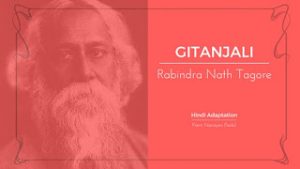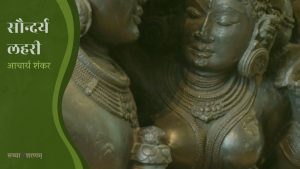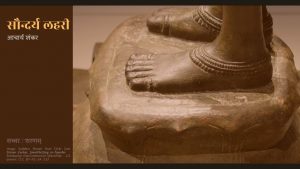I came out on the chariot of the first gleam of light, and pursued my voyage through the wilderness of worlds leaving my track on many a star and planet.
It is the most distant course that comes nearest to thyself, and that training is the most intricate which leads to the utter simplicity of a tune.
The traveller has to knock at every alien door to come to his own, and one has to wander through all the outer worlds to reach the innermost shrine at the end.
My eyes strayed far and wide before I shut them and said, “Here art thou !”
The question and the cry “Oh, Where ?” melt into tears of a thousand streams and deluge the world with the flood of assurance “I am !”
(Gitanjali : Tagore)
लघु नहीं हमारी यात्रा उसमें लग जायेंगे दीर्घकाल ।।
मैं प्रथम चमत्कृत रश्मिरथी बन निकल पडा पथ पर बाहर
नापता रहा अनवरत जगत की भूल–भुलैया भरी डगर
ग्रह नक्षत्रों के बीच विविध छोडा हमने पद–चिह्न जाल –
लघु नहीं हमारी यात्रा उसमें लग जायेंगे दीर्घकाल ।।
सबसे सुन्दर वह क्रम, जब वह मंज़िल आ जाती स्वयं पास
वह सबसे जटिल प्रशिक्षण जिसमें सरस सरलता स्वर प्रवाह
खटकाना होता है यात्री को प्रति अज्ञात कपाट–माल –
लघु नहीं हमारी यात्रा उसमें लग जायेंगे दीर्घकाल ।।
खटकाना होता है प्रति परदेशी पट निज गृह तक आने में
भटकना वहिर्जग में होता अन्तर्वेदी तक जाने में
पावन वेदी तक गमन पूर्व भटकती वहिर्मुख चरण–चाल –
लघु नहीं हमारी यात्रा उसमें लग जायेंगे दीर्घकाल ।।
तब तक भटके मेरे लोचन वहिरंग जगत गति में अमंद
जब तक बोधा न अतंद्रित मैंने चंचल लोचन किए बंद
तुम और कहां हो कहीं नहीं बस यहीं यहीं हो प्रणतपाल–
लघु नहीं हमारी यात्रा उसमें लग जायेंगे दीर्घकाल ।।
जो भी पुकार थी वहिर्मुखी जो प्रश्न उठा “हो नाथ कहां ?”
वह शत सहस्र उमड़ती अश्रु की धाराओं के बीच बहा
“मैं हूं” इस आश्वासन प्लावन में डूबा जग पंकिल निहाल –
लघु नहीं हमारी यात्रा उसमें लग जायेंगे दीर्घकाल ।।
(पंकिल : मेरे बाबूजी)








अद्भुत! अप्रतिम!
हिमांशु, अपने पिता को मेरा धन्यवाद दें. मैं उनसे अवश्य मिलना चाहूँगा. आपसे भी:)
निशांत भाई,
अच्छा लगा । यह दबी आकांक्षा तो इस ओर भी है बहुत ही ।
ठहरा रह गया हूं मैं इन दिनों . . . फिर भी मिलने, बतियाने का लोग तो कुछ लोगॊं से बना ही है ।
एक अमरेन्द्र हैं, जो इस एकाकी मन की टोह लेते हैं कभी-कभी ।
आभार ।
मूल बांग्ला में है, अंग्रेजी अनुवाद से कहीं अधिक भावयुक्त है हिन्दी प्रवाह। पढ़कर बहुत अच्छा लगा।
आप किंचित स्थिर रहे हैं इस बीच. क्या व्यस्तता रही?
बहुत समय पहले मैंने आपको एक विस्तृत ईमेल भेजी थी पर वह किसी गड़बड़ी के फलस्वरूप लौट आई. उसमें मैंने आपके जीवन और अंचल के बारे में कुछ जानना चाहा था.
खैर, अब मन करता है निर्बाध फिरूं, आवारगी को फिर से जी कर देखूं पर सब कुछ इतना सरल भी तो नहीं.
कभी दिल्ली आ सकें तो मेरे निवास को अपना ही समझ सेवा का अवसर अवश्य दें.
बहुत ही सुंदर भावानुवाद…पढ़कर अच्छा लगा।
सुंदर भावानुवाद।
बाबू जी को प्रणाम।
बहुत सुंदर लगी आप के पिता जी की यह रचना, आप की रचनाओ मे भी यही झलक मिलती हे, आप का ओर आप के पिता जी का धन्यवाद
खुद तीन महीने बाद लौटी हूँ ….पढ़ रही हूँ …बिना किसी टिप्पणी के …
पुनश्च अद्भुत!!!
वाकई..अद्भुत..
अभी तक नहीं सुन पाया पिछली पोस्ट का ऑडियो 🙁 आज ये पढने आया तो याद आया. ये तो अद्भुत है ही.
I have read Gitanjali both as an amateur and a serious post-graduate student and possess a type of enchanting attraction towards it but I never felt so emphatically, as I am feeling while reading this poem.(गीतांजलि का भावानुवाद). W.B. Yeats wrote in the Introduction of Gitanjali, "…These verses will not lie in little well-printed books upon ladies' tables, who turn the pages with indolent hands that they may sigh over a life without meaning, which is yet all they can know of life, or be carried by students at the university to be laid aside when the work of life begins, but, as the generations pass, travellers will hum them on the highway and men rowing upon the rivers. Lovers, while they await one another, shall find, in murmuring them, this love of God a magic gulf wherein their own more bitter passion may bathe and renew its youth." This is a statement made by a European for an Indian Poet in Western context. I dare repeat the same statement for a Hindi poet , your honourable father, in very Indian context (particularly north India). This or such work (गीतांजलि का भावानुवाद) helps in seeking the root, unison of diverse in one energetic bond, as it is the core of Tagore’s philosophy, and arousing a national feeling. Actually modern critics, who crow on the issue of works in translation, are the synthetic product of self-alienation and rootlessness and like rats follow the pseudo-western bagpipers with their whole meekness. The time has changed, the work by your honourable father is an example, and we too need to adapt ourselves and feel proud of our language and its generosity to colour all in its own colour. Your honourable father has successfully given the chance of singing Gitanjali on harmonium or flute than harp on a larger scale, albeit Rabindra Sangeet has already did it but in a very particular way as the original text is in Bangala. This work, गीतांजलि का भावानुवाद, negotiate the crap charge that translation could not inherit and sustain the true feeling of any work and opens a new vista and widens the realm of the works in translation. One can embody truth and beauty but one cannot know them, hence I stop with reverence and the mere echo… Superb!…..Excellent”. Please my humble gratitude and salutation to your honourable father, the man letters, a genius and a source of inspiration.
I have read Gitanjali both as an amateur and a serious post-graduate student and possess a type of enchanting attraction towards it but I never felt so emphatically, as I am feeling while reading this poem.(गीतांजलि का भावानुवाद). W.B. Yeats wrote in the Introduction of Gitanjali, "…These verses will not lie in little well-printed books upon ladies' tables, who turn the pages with indolent hands that they may sigh over a life without meaning, which is yet all they can know of life, or be carried by students at the university to be laid aside when the work of life begins, but, as the generations pass, travellers will hum them on the highway and men rowing upon the rivers. Lovers, while they await one another, shall find, in murmuring them, this love of God a magic gulf wherein their own more bitter passion may bathe and renew its youth." This is a statement made by a European for an Indian Poet in Western context. I dare repeat the same statement for a Hindi poet , your honourable father, in very Indian context (particularly north India). This or such work (गीतांजलि का भावानुवाद) helps in seeking the root, unison of diverse in one energetic bond, as it is the core of Tagore’s philosophy, and arousing a national feeling. Actually modern critics, who crow on the issue of works in translation, are the synthetic product of self-alienation and rootlessness and like rats follow the pseudo-western bagpipers with their whole meekness. The time has changed, the work by your honourable father is an example, and we too need to adapt ourselves and feel proud of our language and its generosity to colour all in its own colour. Your honourable father has successfully given the chance of singing Gitanjali on harmonium or flute than harp on a larger scale, albeit Rabindra Sangeet has already did it but in a very particular way as the original text is in Bangala. This work, गीतांजलि का भावानुवाद, negotiate the crap charge that translation could not inherit and sustain the true feeling of any work and opens a new vista and widens the realm of the works in translation. One can embody truth and beauty but one cannot know them, hence I stop with reverence and the mere echo… Superb!…..Excellent”. Please pay my humble gratitude and salutation to your honourable father, the man of letters, a genius and a source of inspiration.
Thank you Himansu Sir